Position of China on the global salary chart
Based on CEOWORLD magazine’s report, Mainland China ranked 63rd on a global list with an average salary of CNY 11,082 per month ($1122). This is a fairly accurate statistic if we are talking specifically about the average salary in China, since it is a very diverse country and wages in various regions, especially rural areas, are radically different. For example, according to China Briefing, the monthly minimum wage in 2023 at Heihe, Yinchuan and Daxinganling in Chinese Yuan was ¥1,450 per month ($205). By the way, the highest average is ¥22,053 per month, which, at the latest exchange rates, translates to approximately USD $3,050 per month. Actual top-tier maximum salary is much and much higher. So let’s dive in and discover what the median salary in China is and answer the key question: how much do Chinese workers get paid, reviewing all aspects of income perspective.This article has been prepared by the WorkTime employee monitoring software team. We are experts in non-invasive employee monitoring, serving companies for 20+ years.
Labor laws in China
In the realm of Chinese labor laws, a delicate equilibrium is struck between safeguarding workers rights and nurturing economic advancement. The Labour Law of the People's Republic of China has been enforced since 1995. Also you should know about the 2008 Labor Contract Law which was amended in 2013. If you are going to hire employees or outsource to the PRC, you should know that it is not enough to simply be familiar with the common Law, since there are a number of serious differences across the country that differ depending on the province. It is very important to take into account that regional legislation is a very significant factor influencing the formation of the average salary in China. In the base of traditional and ceremonial rules, an intricate web of employment regulations and policies common rhythm is synchronized by the interplay of state governments, the scale of businesses, and the tapestry of industries. Wondering what to bear in your thoughts? Here's a concise lineup to ponder:Data security law
Recently the Chinese government implemented a data security Law to regulate and secure data. Now the Data Security Law (DSL) oversees data operations within China and abroad that jeopardize China's national security, public interest, or the legal rights of Chinese citizens and organizations. WorkTime employee monitoring serves defense, insurance, banking, police, government, and other organizations. Read about it’s privacy and safety features.Prioritizing the welfare of workers
Mandatory contributions to social insurance schemes bolster social security, while stringent safety and health protocols prioritize the welfare of workers. Guidelines on termination and severance serve to offer stability and assurance to employees. But they are really complicated and require attentive studying. The recognition of collective bargaining rights and the facilitation of trade unions empower workers to advocate for improved conditions. In agreement with Chinese labor laws, all employees in China must be given a written contract within one month of hiring. Failure to provide a written contract entitles the employee to a double salary. According to Chinese labor law, employees should work a typical five-day work week and should not work for more than 8 hours per day or 44 hours per week.WorkTime includes a feature to measure employee efficiency and productivity without invading privacy. It can also detect false overtime. For instance, it helps identify cases where employees stay late after work but take long breaks during the day, preventing unwarranted overtime payments and saving the company money.
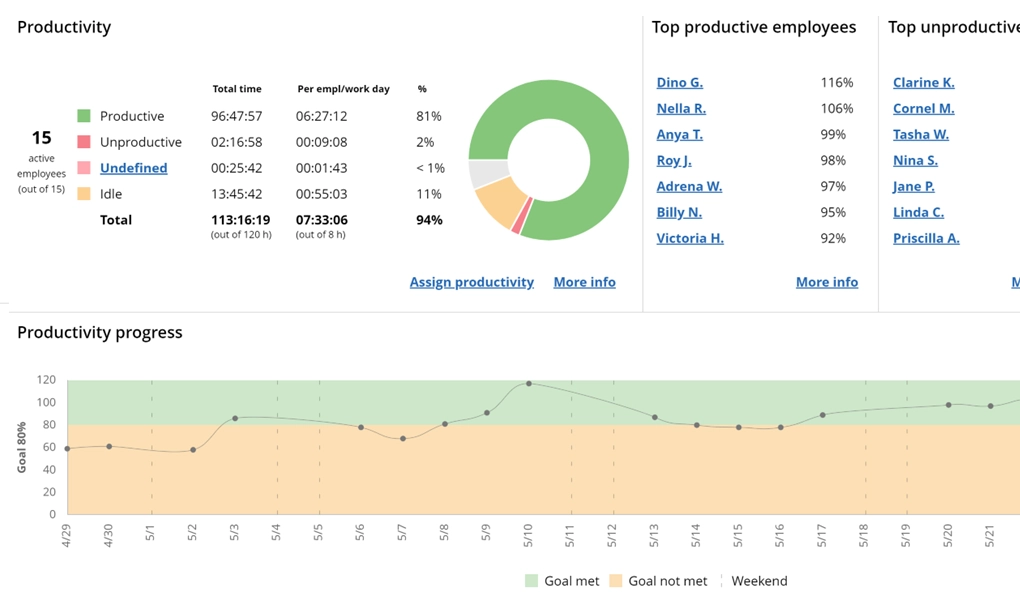

We would like to offer you a personalized demo! Request now!
Book demo
Boost employee productivity with WorkTime! Here's a glimpse of the Productivity Summary Report, where you can see your top productive and unproductive employees, along with productivity progress over the last 30 days. Start your free trial to explore over 60 additional reports!
Start free trialFor your convenience, WorkTime can display holidays or vacations.
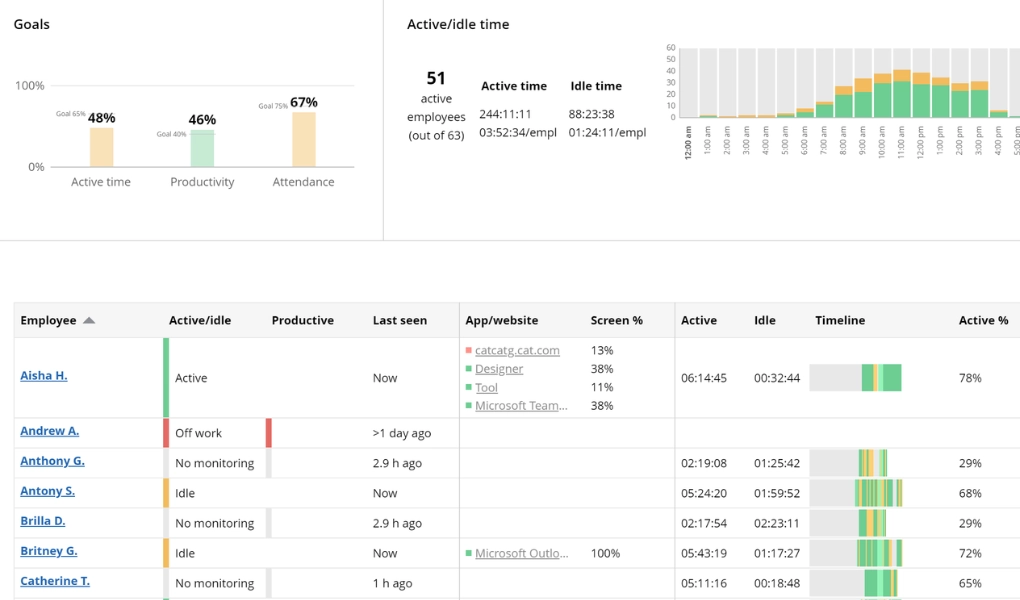
What's going on in the team right now?
The What's now report displays who is on vacation or on holidays (day off), who is active, idle, or off work.
Book demoWhat industry does China heavily rely on?
There are inner and outer sides of the Chinese moon. Everyone is well aware of Chinese imports, which are provided by manufacturing & production, customer service and software development/IT. But what is going inside the country? Due to the rapidly developing unfixed crisis, three of the most important industries in China have suffered: real estate, mechanical engineering and gadgets development. Therefore, there are no prerequisites for observing an increase in average wages in these industries, since most likely the government will make subsidies in order to keep the current indicators afloat. At this moment of our civilizational progress, humanity is entering the sixth technological mode. From the 80th of XX century till nowadays we were developing microelectronics and chips design. In the beginning, electronic memory designs heavily depended on transistor formation, but today we are embracing a future intertwined with nanotechnology. The 30s of the XXI century will be a period of development of robotics, as indicated by the current market trend. In this field, China has practically unlimited resources. Currently, there is a growing trend of technological advancements in China's military sector. In addition, tensions are now growing in the Taiwan strait region and near the territorial waters of the Philippines, so the factor of the Chinese economy switching to military rails cannot be ruled out. Solid factor that affects all types of China industry from manufacturing to agriculture and technology is the demographic crisis in Mainland China which can seriously damage their own marketing.Average salary in China and its impact on outsourcing
What is the average salary in Mainland China? Truth to be told, average income in China is influenced by education and experience levels, with individuals possessing advanced degrees and extensive professional backgrounds typically earning higher wages. Education plays core role and here is why: Individuals holding a diploma certificate earn 18% more than high school graduates. Employees with a Bachelor’s degree earn 26% more than those with a diploma. Master’s degree holders earn 31% more than Bachelor’s degree holders. Chinese employees with a Ph.D. earn 25% more than those with a Master’s degree. Also it depends on the sphere, location, age, gender and experience. Industries like Information Technology, finance, and pharmaceuticals typically provide higher pay as there is a growing need for skilled workers. On the other hand, traditional sectors with an excess of labor may offer lower salaries. The impact and proportion of the average salary in China on outsourcing is a significant reduction in labor costs for companies seeking cost-effective solutions. It is necessary to understand that the impact of average salary in China on outsourcing has been profound, as companies have leveraged lower labor costs in PRC to optimize their operational expenses and remain competitive in the global market. This shift has led to a significant reconfiguration of supply chains and business models, with many organizations choosing to outsource manufacturing and services to China to capitalize on the cost advantages offered by the country's labor market. Additionally, the availability of a skilled workforce in China has further enhanced its attractiveness as an outsourcing destination, enabling companies to access specialized expertise and talent while keeping costs under control. Overall, the influence of Chinese salaries on outsourcing underscores the strategic importance of labor cost considerations in shaping companies' outsourcing decisions and long-term competitiveness in today's interconnected economy. But, how much do Chinese workers get paid? Basen on Olivier Verot scrutiny, the national monthly average salary in China in May 2023 was ¥29,300 which now is equivalent to $4050. Compared to 2023, through the crisis and inflation in China, the final check in 2024 was reduced by $164, which Chinese workers would have lost in conversion as of today. It is essential for any business venture contemplating the recruitment of local talent or establishing operations in particular regions across Mainland China to grasp the significance of regional salary variations. According to Salary Explorer, in 2024 a person working in PRC typically earns around 29,400 CNY per month ($4064). Salaries range from 7,410 CNY ($1024) for the lowest average salary in China to 131,000 CNY ($18.1K) for the highest average salary in China, the actual maximum wage is higher.Average salary by age in China
Another factor influencing an individual's average salary in China is their age. Let’s look and analyze the gap between average and median salary in China. Here is a short overview of salaries in China from Paylab: For individuals under the age of 24, the average salary is around 7,155 CNY ($989) with a median of 6,576 CNY ($909). Young people with a master's degree or above can earn salaries between 8,000 and 25,000 RMB/month ($1105 – $3456). As age and experience increase, the average salary also tends to increase. For individuals between the ages of 25-34, the average salary is around 9,569 CNY ($1322) with a median 8,468 CNY ($1170). The highest salary average is for 35-44 y.o. category – 10,893 CNY ($1505) with a median 9,388 CNY ($1297). Wages after 45 years decrease slightly and this is pretty noticeable for the category of citizens who are 55+ years old.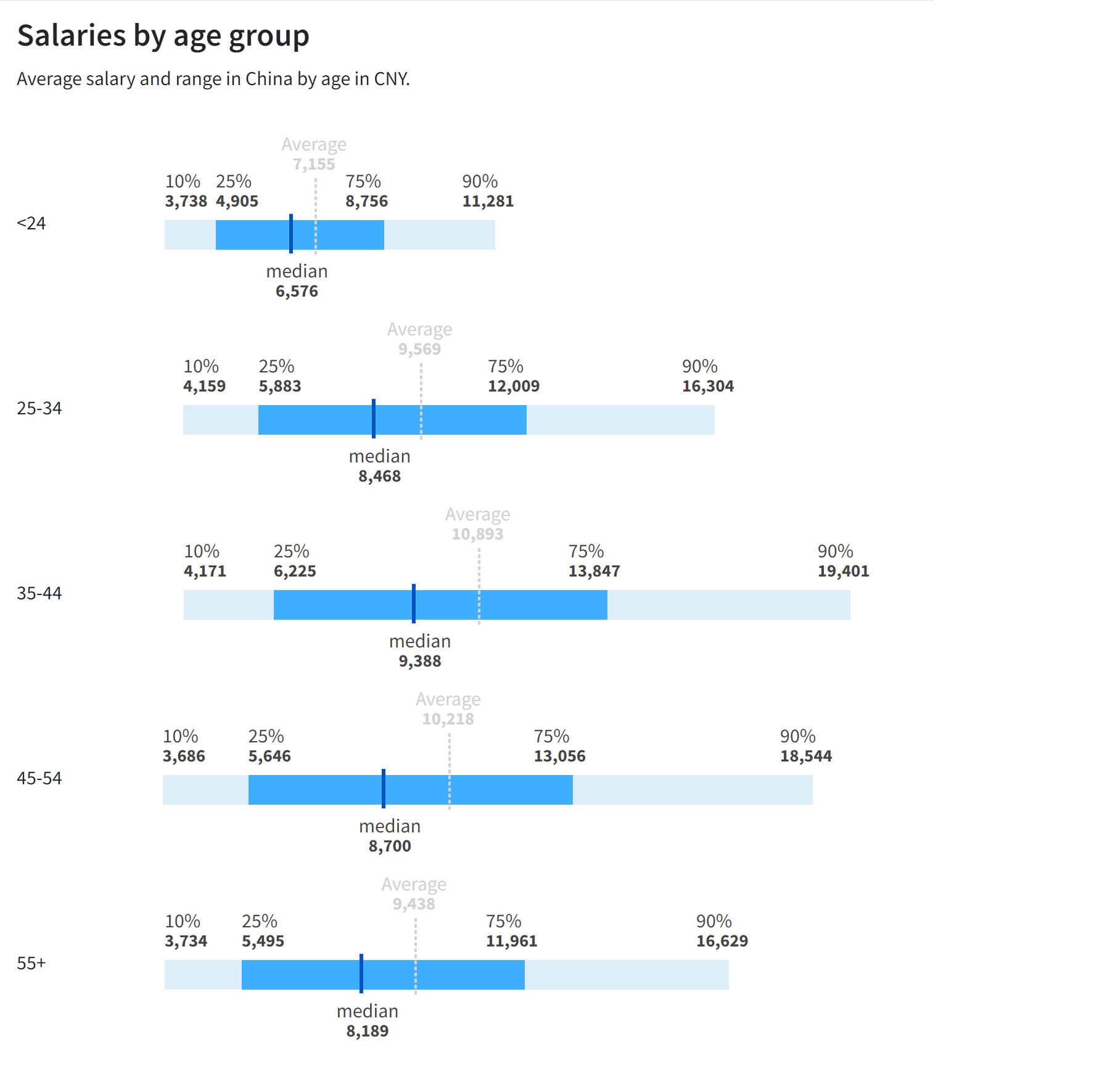
Highly paid jobs: average salary in China
To be more accurate we can take a deep dive into occupations and find that the average salary in China of in-demand roles depends on the sector. For example, This average IT salary in China completely depends on the specialization and personnel demand ratio, because a strong Sales Manager can make ¥480,000 per annum ($66,3K). The average yearly salary in China for an Accountant is ¥340,000 per annum ($47K) and ¥280,000 for an IT Manager ($38,7K).Average salary in China for software engineer
There is no secret that the technology sector is one of the blood arteries of the country's economy. As stated in the newest research in 2024 the average salary in China for software developers is $57,000 and it’s the highest indicator of average annual income for IT niche in China and region generally. It can be assumed that this is due to the fact that the country’s government has set a course for the correlation of dual-use goods with miltech. According to Paylab, here is Top-7 best paid positions and their average monthly salary in China in 2024 (CNY/USD): Chief Executive Officer (Top Management) – ¥26,427 = $3653 IT Director (Top Management) – ¥24,536 = $3392 Country Manager/Director (Top Management) – ¥23,687 = $3275 Call Centre Director (Top Management) – ¥23,669 = $3272 Leasing Director (Leasing) – ¥23,042 = $3185 Production Director (Top Management) – ¥21,175 = $2927 Plant manager (Top Management) – ¥21,067 = $2912The cost of living in Mainland China
In the post-Covid era, average wage in China started growing, but the cost of living in the country varies by region due to economic diversity. Urban areas like Shanghai and Beijing are pricier than rural parts. Estimated monthly expenses for a family of four (excluding rent) average around $2,016 (¥14,583), while for a single person, it's about $557 (¥4029). Living costs in China are notably lower than in the United States. When looking at housing costs, rent in Mainland China is on average 71.9% lower than in the United States. For example, Shanghai, with a cost of living index of 55.94, is 44.06% cheaper than NYC, excluding rent. The cost of living in China depends on various factors, including: Housing: Rent prices can vary significantly depending on the city and the type of accommodation. Food: The cost of groceries and dining out can vary based on where you shop or eat. Transportation: Owning a car or taking taxis versus using public transportation can impact your expenses. Healthcare: Access to healthcare services and insurance coverage can affect your cost of living. Education: If you have children, the cost of international schools or local schools can be a significant expense. Entertainment: Expenses related to leisure activities, dining out, and cultural events can contribute to overall living costs. Inflation and Exchange Rates: Economic factors such as inflation rates and exchange rates can also influence the cost of living in China. Regarding the Msadvisory, Shanghai is the most expensive city in Mainland China to live in 2024 with rent index 41.38%. Guangdong province also is in the top with Guangzhou, Shenzhen and Zhuhai cities. Beijing placed 3d with a cost of living Index of 55.19%, excluding rent plus 45.42% of rent index. The cheapest cities are Lhasa in Tibet and Xining in Qinghai province.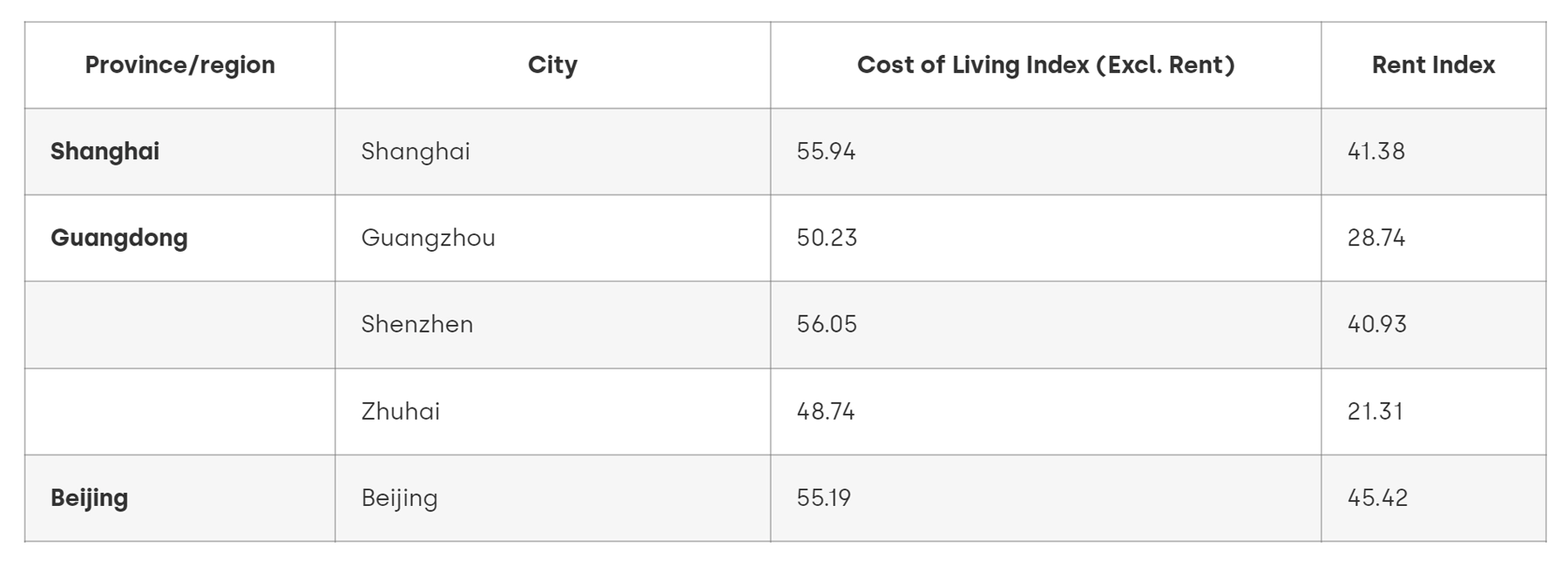
Where does China outsource to?
From the 90's of XX century till present, China outsources to various destinations for different types of services. One of the favorite destinations for outsourcing in China was India, but now this trend has begun to decline due to rivalry between countries. The situation was also influenced by the fact that in recent years Chinese legislation has become more strict, while Indian one has become more flexible. By the way, India is a well-known outsourcing destination for IT services. Many Chinese companies still outsource their software development, IT support, and other technology-related services to Indian companies. The Philippines is another strong player in the outsourcing industry. Chinese companies often outsource customer support, call center services, and business process outsourcing (BPO) operations to Philippine companies. Malaysia is emerging as a popular destination for outsourcing. Chinese companies outsource services such as software development, data entry, and administrative tasks to Malaysian companies. Singapore is known for its advanced infrastructure and skilled workforce. Chinese companies outsource services like finance and accounting, legal support, and marketing to Singaporean companies.Which country outsources the most to China?
According to Statista in 2024 Top-5 countries which outsource to China the most in IT sector is: USA UK Japan Germany Inner China (means Macau and Hong Kong companies which should have been update their data or re-registered due to new policy) In robotics area Top-5 out outsources to China is: South Korea Singapore Inner China Switzerland Germany It is also worth considering the growing percentage of Pakistani, Laotian and Brazilian factors of outsourcing, which increased their presence in China.China – the outsourcing giant in the world
PRC is considered the outsourcing giant for several core reasons. Here are some key factors and advantages of outsourcing manufacturing to China that contribute prominence in the industry:Cost-Effectiveness
China offers cost-effective solutions for outsourcing due to its lower labor costs compared to many other countries. This makes it an attractive destination for businesses looking to reduce their operational expenses.Vast Pool of Talent
China has a large pool of skilled and educated professionals across various industries. Key benefits of outsourcing to China include the fact that businesses can access the mentioned talent pool of humans and make profit from the expertise and specialized skills available in the country.Manufacturing Capabilities
China has established itself as a global manufacturing hub. The country has a well-developed infrastructure and a robust manufacturing ecosystem, making it an ideal choice for companies looking to outsource their manufacturing operations.Market Access
Outsourcing manufacturing to China provides businesses with access to the vast Chinese market. With a population of over 1.4 billion people, China offers significant opportunities for companies to expand their customer base and tap into new markets.Innovation and Research
China is known for its focus on innovation and research. The country has a strong emphasis on technological advancements and supports research and development initiatives. By outsourcing to China, businesses can benefit from the innovative environment and leverage the advancements made in various industries.The most outsourced places in China
Core advantages of outsourcing to China lies in the breadth of the range of directions and sectors that they represent. Here you can practice cultivation of your business by building different social connections. Let’s review are some of the most outsourced places in China:East
Shanghai-Jiangsu-Zhejiang: Shanghai is the most populous mainland city and serves as the international hub of finance, trade, and innovation. Suzhou: Suzhou is known for its rich historical and cultural heritage. It is one of the most important cities in the Yangtze River Delta region.North
Beijing-Tianjin-Hebei: Beijing, the second largest urban city by GDP (over RMB 3 trillion in 2018), is chosen as headquarters by many of China's largest state-owned firms. It hosts the highest number of Fortune Global 500 companies in China. Chaoyang District, known as Beijing's Wall Street, is a magnet for foreign investment thanks to its favorable investment climate,excellent transport links, and top-notch telecommunications infrastructure.South
Greater Bay Area. Guangzhou and Shenzhen are top business hubs in Southern China. Guangzhou is excelling in producing high-end products like automobiles and hi-tech goods, positioning itself as an innovation center in the province.West
Chengdu-Chongqing. Chongqing serves as a gateway to China's vast western interior. Despite being twelve times larger than Shanghai, land prices in Chongqing are significantly lower than those in coastal cities. These cities have been identified as attractive destinations for outsourcing and offshoring due to their strong domestic markets and favorable business environments. To sum up, China is the outsourcing giant primarily due to its cost-effectiveness and vast pool of skilled talent. Choosing PRC for outsourcing provides easy access to lucrative markets due to its strategic geographical location, while also offering significant opportunities in a vast market with low labor costs, resource-rich manufacturing, and export capabilities.Rethinking of Chinese BPO’s fundamentals in 00’s-10’s of XXI century
In keeping with research “The Structural Analysis of BPO in China” made by authors Pei-Zhi Wang and Hong Zhu, published by Atlantis Press, we know that since the year from 2008 to 2014, chinese outsourcing service has experienced rapid development in total, especially in our BPO. Although the 2008 financial crisis caused a deep influence on its development. Also it is very important that under the rule of pro-Western Hu Jintao, who was general secretary of the Chinese Communist Party (CCP) in 2002-2012 the structure of BPO in China has become homogenous and started including transaction, market and industrial structures.WorkTime aids in building a targeted and productive IT team through customized monitoring software. Remote workers can easily become distracted and disengaged, but with WorkTime, maintaining their productivity is simple.
The first outsourcing company in China
The history of global outsourcing to China started in the dark side of the 1970s with the emergence of business process outsourcing (BPO). This is the milestone when PRC started exporting inexpensive textiles and electronics to Europe and North America. A lesser-known fact about China's export industry is that it was controlled by Hong Kong and Taiwanese business families who established their enterprises in the 1960s and 1970s before transitioning to China in the 1980s and 90s. According to Facts and Fallacies about U.S. FDI in China during the late 1970s, China started implementing more market-oriented economic policies than it had previously, and this shift has proven highly successful in driving economic growth. China gradually began to immerse itself in how outsourcing works and in 1988 Synjones was set up and entered the field of smart card.What are the big 4 BPO companies in China?
As of 2024, there are three BPO tigers in China why have been recognized for their expertise and quality services:Welsend
This company was founded in 1993. Welsend is another top BPO company in China that offers a range of outsourcing services.Synjones
Synjones is a reputable BPO company in China that provides various business process outsourcing solutions. They were established in 1988.FDI China
It is known for its BPO services and received many positive reviews in May 2024. FDI China is a non-state-owned consulting firm based in Shanghai that helps foreign companies enter and develop their business operations in China. Company was founded in 2016.INFITECS
Nimble, available and responsive team of professionals. They pay close attention to maintaining a real relationship with your key people to ensure that we deliver exactly what we promise. Company was founded in 2013. Have doubts? Thoroughly track the work activities of your call center staff by using Work Time. Keep an eye on metrics such as active time, engagement during calls, visit frequency, distractions, and other relevant indicators.BPO regulations in China
The main rules of Business Process Outsourcing company regulations in China can vary depending on specific laws and regulations. However, here are some general guidelines that BPO companies in China typically need to adhere to:- Business Registration: BPO companies in China are required to be registered with the Bureau of Industry and Commerce (BIC) or the China Council for the Promotion of International Trade (CCPIT). This registration process ensures that the company operates legally and complies with the necessary regulations.
- Capital Requirements: According to the new Company Law in China, shareholders of a limited liability company must pay in the entire subscribed capital within five years from the establishment of the company. This requirement ensures that the company has sufficient capital to operate effectively.
- Data Security: BPO companies in China need to ensure the security and protection of data. With the availability of technology and a global data network infrastructure, BPO companies must implement measures to maintain data confidentiality and prevent unauthorized access.
- Accounting Compliance: BPO companies operating in China are required to comply with Chinese accounting laws and regulations. This includes the compilation of monthly statutory financial statements, such as balance sheets and income statements, according to Chinese accounting standards.
Outsourcing to China pros and cons
What makes China the top outsourcing destination? Mainland China stands out as a leading outsourcing destination due to a variety of factors. Let's explore some reasons and highlight the main significance of the benefits of outsourcing to China.Cost-effectiveness
China offers competitive labor costs, making it an attractive option for companies looking to reduce expenses. The availability of a large workforce allows for cost-effective outsourcing solutions.Skilled labor pool
China has a vast pool of skilled workers, particularly in industries such as manufacturing, technology, and engineering. The country's emphasis on education and technical training has resulted in a highly skilled workforce.Infrastructure
China has invested heavily in developing its infrastructure, including transportation networks, communication systems, and industrial parks. This infrastructure supports efficient outsourcing operations and facilitates the movement of goods and services.Market potential
China is the world's most populous country, offering a vast consumer market. By outsourcing to China, companies can tap into this market and gain a competitive advantage. Talking about the main benefits of outsourcing to China, this is probably one of the most valuable ones.Government support
The Chinese government has implemented policies and incentives to attract foreign investment and promote outsourcing. These measures include tax incentives, streamlined regulations, and special economic zones.Manufacturing capabilities
China is known for its manufacturing capabilities and has a well-established supply chain. This makes it an ideal destination for companies looking to outsource manufacturing processes.Technological advancements
China has made significant advancements in technology and innovation. This includes areas such as artificial intelligence, robotics, and e-commerce. By outsourcing to China, companies can leverage these technological advancements.Geographical location
China's strategic location in Asia provides access to regional markets. This makes it an ideal hub for companies looking to expand their presence in the Asia-Pacific region. In China, the dominant manufacturing sector, responsible for 28.7% of global output in 2019, allows businesses to avoid import tariffs by producing goods locally, benefiting from lower costs and an interconnected supply chain within Chinese cities. While presenting many benefits of outsourcing to China as an outsourcing location, it's crucial to carefully assess each company's unique needs and preferences before reaching a decision. Major cities like Beijing, Shanghai, and Shenzhen tend to have higher living costs compared to smaller cities and rural areas.Enhance performance with non-invasive employee monitoring using WorkTime!
What are the problems with outsourcing to China?
Time moves through the post-WWII era when the US dominated everything, so let’s skip the history lesson for now and take the reality as it currently is. In 2024, China is the main strategic enemy of the United States, and enormous amounts of money will have to be spent to contain it. The USA is facing significant challenges that require a comprehensive systematic overhaul, something that should have been done 20 years ago. Under current circumstances, the environmental friendliness of outsourcing to China is being questioned. If we take a break from the geopolitical situation and the basics of geoplanning, we are still faced with a number of procedural difficulties that companies may encounter when outsourcing to China: Low service or product quality One of the challenges of outsourcing to China is the potential for lower service or product quality compared to other outsourcing destinations. This can be attributed to variations in manufacturing standards, quality control processes, and the need for effective communication. Different IPR laws Intellectual Property Rights (IPR) protection can be a concern when outsourcing to China. The country has its own set of IPR laws, which may differ from those in the company's home country. This can pose risks of loss or misappropriation of intellectual property rights and trade secrets. Language barriers can create communication challenges when outsourcing to China. The lack of language skills among outsourced employees can lead to misunderstandings, lost credibility, customer service complaints, and missed opportunities. Outsourcing to China may involve longer lead times due to factors such as distance, time zone differences, and potential delays in communication. This can impact project timelines and overall efficiency. It's important to note that these challenges are not exclusive to outsourcing to China and can be mitigated through proper planning, communication, and due diligence. Each company should carefully consider its specific needs and requirements before making a decision on outsourcing destinations. Last but not least is the fact that China is not a cheap labor market anymore. China's economic growth since the 1980s was driven by abundant cheap labor, earning it the title of "the world's factory." In recent years, China has shifted focus to high-tech manufacturing and services, attracting investors to its expanding domestic market. Consequently, the average wage in China increased alongside living costs. Solve productivity challenges and increase performance of your employees in the blink of an eye with Work Time!What is the current state of outsourcing in China?
For outsourcing destinations, American companies choose China IT outsourcing in some cases. Generally, smaller consumer electronics and consumer goods went to China, but there are also giants who are ready to invest in equipment modernization and have found compelling arguments for their benefits. According to Reuters China's factory and services activity growth slows in April 2024, this can negatively affect many relative industries in the next quarter. One more factor is that people have questions about data confidentiality due to mistrust of the Chinese government and its hostile attitude towards non-residents. Despite all the risks, the forecast is far from pessimistic. Revenue in the market of IT outsourcing in China is projected to reach $29.03 billion in 2024. Revenue is expected to show an annual growth rate (CAGR 2024-2029) of 9.31%, resulting in a market volume of $45.31 billion by 2029. In addition, there is still a strong tendency for American companies outsourcing to China. The U.S. and China will be the most vulnerable and sensitive to the massive volumes of debt piling up around the globe, because of rising alert over all the red ink which was abundantly spilled during the last decade. Currently, the global growth rate stands at approximately 3.2% per year. This figure, while respectable, falls short of the 4% trend growth that the world had experienced for at least several years. Are you thinking about outsourcing to China, but are you worried about whether this idea will be successful? WorkTime will save your money and increase your chances of success thanks to employee internet usage monitoring.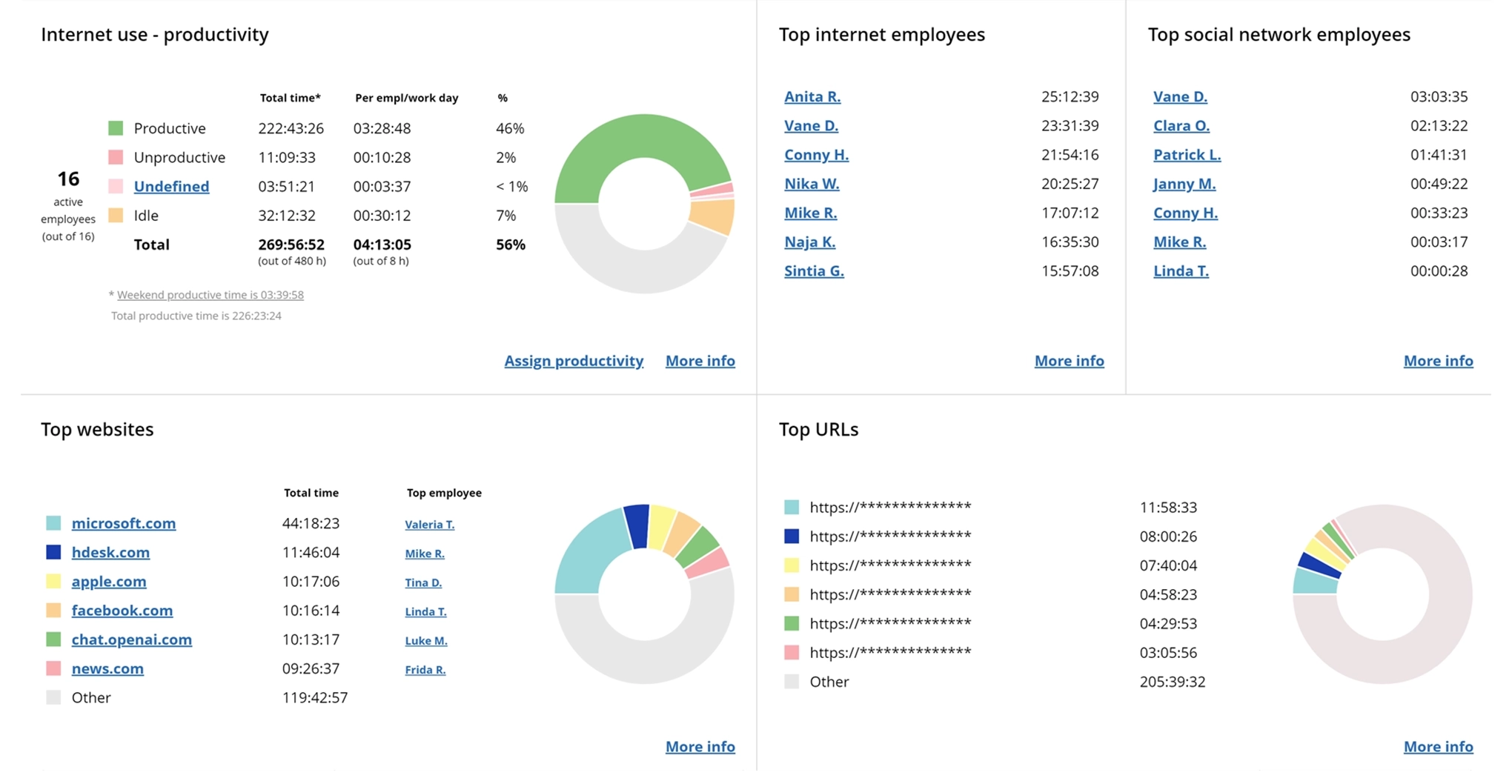

With WorkTime, you can monitor employee internet activities, including time spent in online meetings, websites and URLs visited, and whether these activities are productive or not.
Start free trialChina vs India
Currently, India is a global BPO provider, making it one of the most profitable countries for outsourcing. What’s more, the Indian IT sector is expected to increase its annual revenue to $300-350 billion by 2025. Consequently, we see that India is now China’s main competitor in the region, which provides cheaper services and has more favorable legislation, which attracts foreign capital. However, it should be noted that India remains in the 5th technological order, while China is spending large amounts of money to modernize its production belts and planned transition to the 6th technological order. In this situation, despite the relative equality in the space program, China in the future has every chance of leaving India far behind, if it overcomes the demographic crisis. Following OECD’s GDP growth projections for 2024 and 2025 China will grow by 4.9% year-on-year while its closest opponents are Indonesia with 5.1% and India with 6.6%. Also, due to statistics, in 2024 average monthly wage in China is much higher than in India. Living today, a person is already creating his future, so it is important to understand what is the difference between India and China in robotics today. The difference is too big for it not to be obvious. By 2024, in China the revenue is expected to reach $6.82 billion, while in India the projected revenue in the robotics market is expected to reach $694.1 million. According to the Economic Research Institute, the normal salary in China for a Robotics Engineer is CNY 353,447 ($49,336) a year and CNY 170 ($23,73) an hour. The average salary range for a Robotics Engineer is between CNY 243,525 ($33,992) and CNY 431,206 ($60,190). Hence, China's average income in Robotics is one of the biggest in the region. So far, all think tanks agree that the biggest jump in average pay in China is expected in the robotics sector.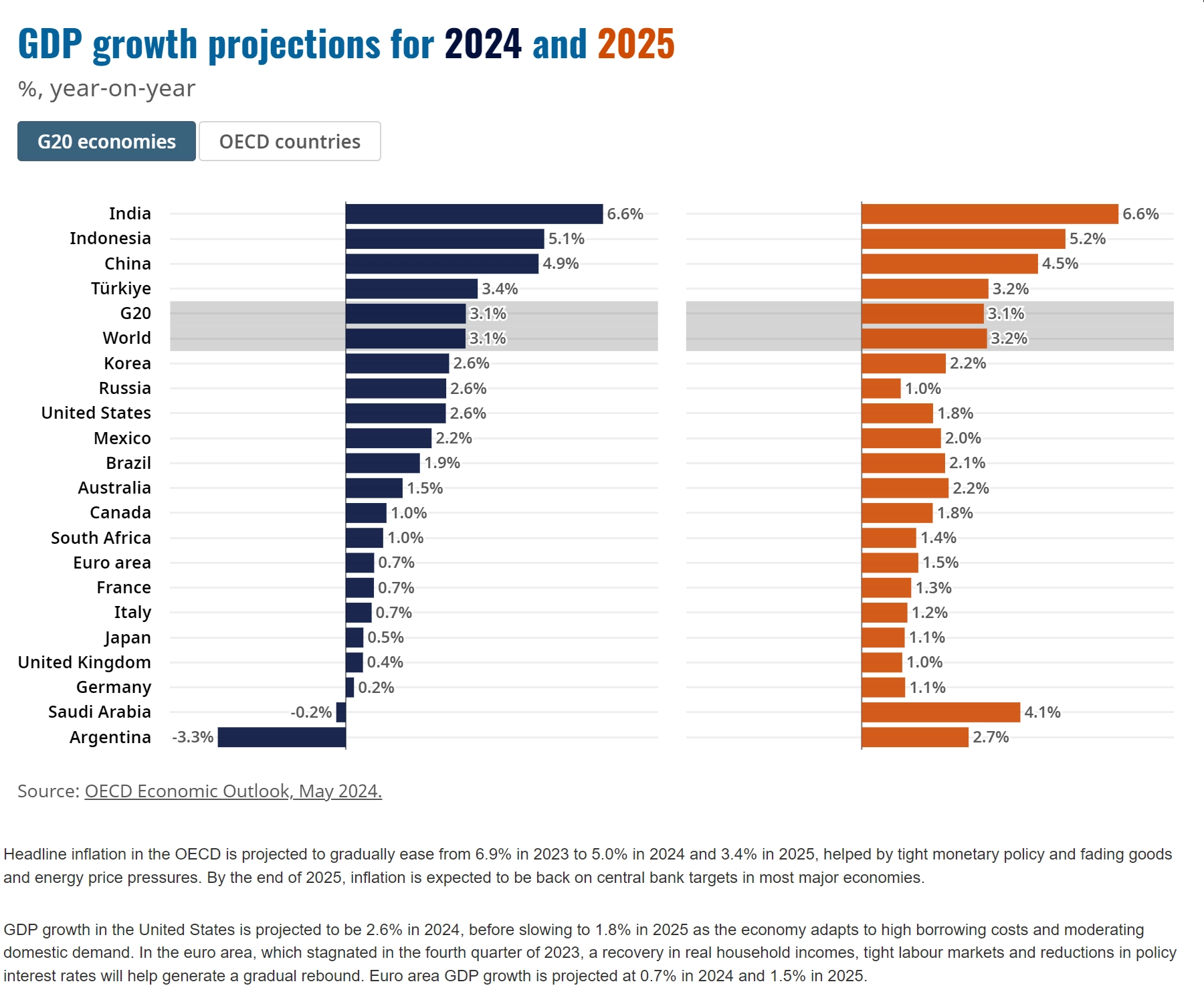
Employee monitoring in China
Employee monitoring in China is legal, because there is no direct legislation on employee monitoring in China. You can check more info about how exactly China’s companies can legally collect employee personal information. The legality of workplace surveillance in China has been addressed and discussed primarily as an employment law matter. Employers in China can rely on the latest version of the Chinese Personal Information Protection Law (PIPL) as the primary legal source for monitoring employees. The PIPL offers three lawful grounds for monitoring, which include the satisfaction of a legal obligation of the employer. Labor-related laws and regulations in China also support the employer's legal ground to collect employee personal information for monitoring purposes. However, it is important for employers to consider regulations and guidelines when monitoring employees in the workplace, including aspects like telephone monitoring and CCTV surveillance. Balancing the need for monitoring to ensure workplace safety with respecting employers privacy rights is crucial for maintaining a harmonious work environment.WorkTime aids companies in managing outsourcing tasks and processes by employing non-invasive monitoring. WorkTime reports provide comprehensive metrics on efficiency and productive time. Furthermore, such monitoring contributes to the security of outsourcing processes, particularly when data confidentiality is of utmost importance.Employee monitoring software can provide advantages for both employers and outsourcing agencies. Employers can have confidence in the high performance of their outsourced employees, while outsourcing agencies can differentiate themselves from competitors by ensuring the quality of their services through contractors' productivity monitoring.
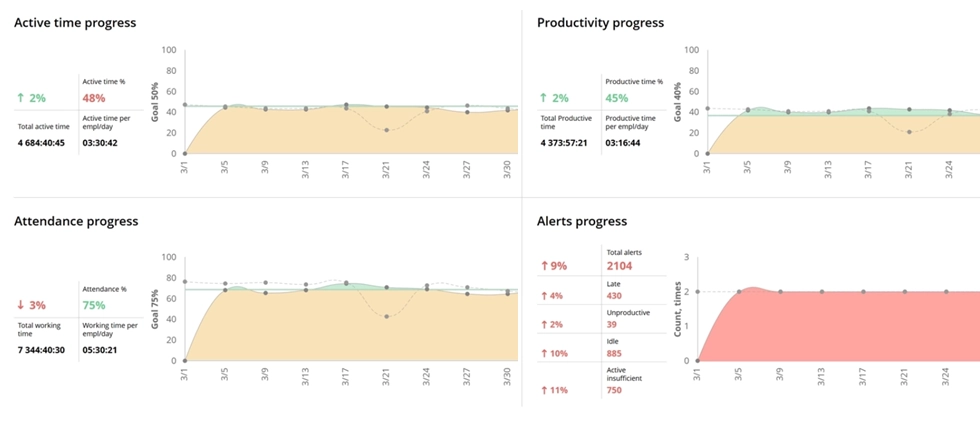
- Governing Texts: there are legislation and guidelines relevant to employee monitoring in China. These texts outline the rules and regulations that employers must follow when implementing monitoring practices.
- Telephone Monitoring: when it comes to recording telephone conversations, there are specific rules that employers need to adhere to. These rules govern the recording and monitoring of phone calls in the workplace.
- CCTV Surveillance: closed-circuit television (CCTV) is commonly used for surveillance in Chinese workplaces. Employers may install CCTV cameras to monitor employee activities and ensure security. However, there are likely regulations and guidelines that dictate the appropriate use of CCTV surveillance.
It is easy to measure KPIs with WorkTime tools and reports. WorkTime makes you able to monitor all the goals: productivity, attendance, and active time, etc.
Employee monitoring makes outsourcing more attractive
Employee monitoring makes outsourced team management easy and effective. WorkTime evaluates productivity, attendance, active/idle time, Internet use, distraction score, and more. And as a result, you get 50+ non-invasive reports with comprehensive statistics on your employees' performance. Benefit from outsourced team monitoring with WorkTime:- Multi-office monitoring. Monitor in-office and outsourced employees across multiple offices. Compare performance, add different locations, and receive detailed reports on productivity, active time, and attendance by office
- Tracking outsourced team productivity. Boost remote employee productivity with goal-setting using our monitoring software.
- Green employee monitoring approach. Non-invasive monitoring corresponds to strict Indian laws. So, you can monitor your employees with respect to their privacy
- Ensuring the engagement of remote employees. Stay confident in employees’ engagement with apps/website usage, screen productivity, and Internet use reports. Observe the productivity progress of your outsourced team.
- Automatic active time monitoring. A different time zone is not a problem with WorkTime. Our software tracks active/idle time, activity progress, and daily active time per employee accurately.
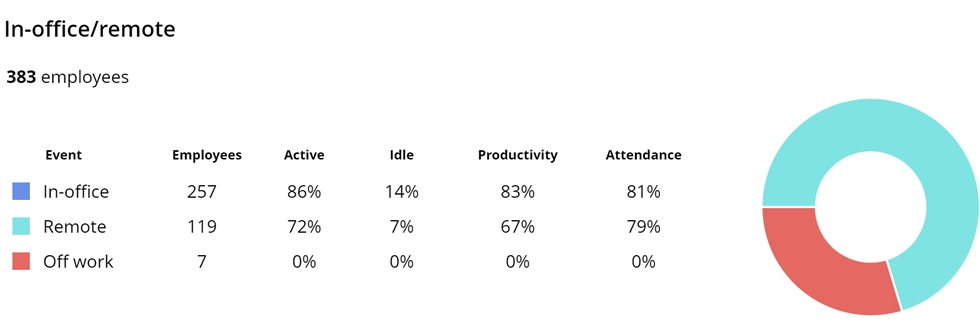

Request demo now!
WorkTime more than doubled active time in remote employees for this Japanese-UK bank. To find out how WorkTime can help your company - contact us now!
Book demo









